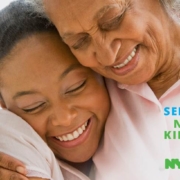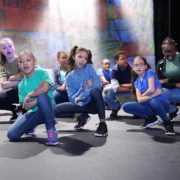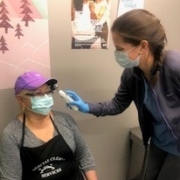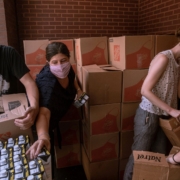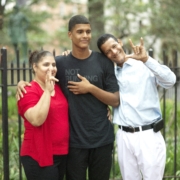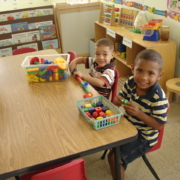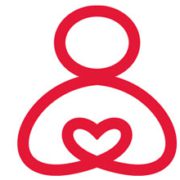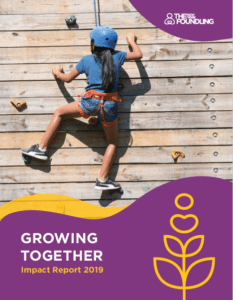For over 150 years, The New York Foundling has worked in partnership with our neighbors to ensure that everyone can meet their full potential when facing challenging situations. This hasn’t changed, and our staff continue to provide life-changing and meaningful support in light of the COVID-19 pandemic. This series shares how The Foundling’s many programs are responding to the needs of their community.
In Puerto Rico, The Foundling serves 1,500 children through Head Start and Early Head Start programs. Our Early Head Start program is home-based and serves expecting mothers, infants, and toddlers. The program promotes strong parent-child relationships and helps provide high-quality early learning experiences. Our Head Start program delivers high-quality early education and child development services to children ages 3-5 in San Juan, Cataño, Vega Alta, Coamo, and Toa Baja.
The families and Foundling staff in Puerto Rico have shown tremendous resilience and perseverance, despite the devastation caused by the 2017 hurricanes, a series of earthquakes at the start of 2020, and now, ongoing hardship as families try and stay safe and healthy during the COVID-19 pandemic.
In response to devastation caused by hurricanes in 2017 and earthquakes in 2020, The Foundling’s Early Head Start and Head Start programs in Puerto Rico were already accustomed to delivering services in new and creative ways when COVID-19 hit. “How school and teaching is conducted here changed after Hurricane Maria,” says Carmen Villafane, Senior Vice President of the two programs. “We’ve had some practice with online learning and using digital tools.” Throughout the pandemic, our teachers have become more and more creative with their teaching methods. They’re finding new online learning and practice programs for students. They’re posting instructional videos on how to do the day’s activities, and they are recording videos of themselves reading stories and sending them to the families.
Since schools in Puerto Rico have been closed since March due to the pandemic, teachers and staff have also been sending care packages to students and their families with materials including scissors, paper, pencils, markers, glue, crayons, and other craft materials. That way, when teachers assign activities and projects to do, the families are able to complete them. “Without these materials, the children would lose the crucial skills they need to progress to the next step in their education,” Carmen explains. “So, we’re doing everything we can prepare them and ensure that nothing stands in their way of educational success.”
Activities are geared towards promoting children’s cognitive, social, and emotional growth for later success in school. The program delivers developmentally, culturally, and linguistically appropriate learning experiences in language, literacy, mathematics, social and emotional functioning, science, physical skills, and creative arts.
Teachers host a weekly virtual class and support activities throughout the week. In addition to engaging children and parents, other members of the household are welcome to join as well. During this time together, everyone is able to participate in activities such as songs, stories, and crafts, as well as teacher-guided discussions about COVID-19 and general health and safety measures. “Off-screen, the parents have done a wonderful job working with their children on educational activities,” Carmen commented. For example, teachers will recommend an activity for parents to work on with their children at home, such as making homemade Play-Doh or “Plastilina,” and the parents will share their videos of family craft-time with the teachers.
Early Head Start, which provided home-based services to 36 families before COVID-19, is now held online. Vocational home visitors, who work with a child’s family to ensure their home environment supports their well-being and education, are trained to identify family needs in both online and in-person settings. They develop programming, handle assessments, and if a need arises that requires specialized care, they provide referrals to nurses, social workers, mental health professionals, or other community resources.
Throughout the year, and especially in times of crisis — be it a hurricane, an earthquake, or a global pandemic — the families served by our Head Start programs often struggle to have their basic needs met. “Food is too often in short supply,” Carmen notes, “It’s a common challenge our families face. But with the help of local charities and generous donations, we have been able to buy and supply grocery bags full of food to the families we serve.”
“I am so proud of my employees,” Carmen adds, “They have all gone the extra mile, which is what we need in this moment, and what we’ve needed in every moment since Hurricane Maria. Earthquakes still affect south Puerto Rico every day, and there’s no end in sight. And yet, despite the uncertainty, our staff wakes up every morning prepared and ready to serve. I couldn’t be more proud of them for their hard work and continued commitment. The Foundling’s presence here in Puerto Rico really makes all the difference.”
To learn more about how The New York Foundling is responding to the COVID-19 pandemic in New York, visit our emergency response page. Stay tuned for more stories from the frontlines as we continue to support our neighbors on paths to stability and strength.
Read past posts in the ‘Our Work Continues’ blog series:


